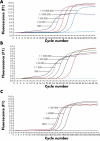Discordant quantitative detection of putative biomarkers in nodal micrometastases of colorectal cancer: biological and clinical implications
- PMID: 16049286
- PMCID: PMC1770861
- DOI: 10.1136/jcp.2004.023853
Discordant quantitative detection of putative biomarkers in nodal micrometastases of colorectal cancer: biological and clinical implications
Abstract
Aims: Nodal expression of the carcinoembryonic antigen (CEA), cytokeratin 20 (CK20), and guanylyl cyclase C (GCC) genes was measured in tandem in patients with colorectal cancer (CRC) to assess whether there would be sufficient agreement between these markers in their ability to detect micrometastasis to qualify one of them as a universal marker, and whether frozen and paraffin wax embedded tissues would yield similar results.
Methods: One hundred and seventy five frozen lymph nodes (FT) and 158 formalin fixed, paraffin wax embedded lymph nodes (PET) from 28 CRC cases were analysed using gene specific quantitative real time polymerase chain reaction, carried out on the LightCycler system with SYBR Green chemistry.
Results: There was significant disparity in positive detection of the three biomarkers in FT versus PET, with notable agreement achieved only for CEA (66.6%) in FT versus PET in Dukes' B disease, and between CK20 and GCC (44.6%) in FT, also in Dukes' B disease. One patient with full concordance in all three tumour markers with both tissue types suffered a relapse and died within two years of follow up.
Conclusions: There was considerable discordance in the positive detection of the three tumour markers in both tissue types (FT versus PET). This brings into question whether using a single tumour marker to detect micrometastasis in one tissue type (FT or PET) is adequately representative, and challenges the concept of universal markers for molecular CRC metastatic detection. Multiple tumour markers would predict more accurately the metastatic potential of Dukes' B CRCs.
Figures




Similar articles
-
Detection of occult metastasis in lymph nodes from colorectal cancer patients: a multiple-marker reverse transcriptase-polymerase chain reaction study.Dis Colon Rectum. 2004 May;47(5):679-86. doi: 10.1007/s10350-003-0118-2. Epub 2004 Mar 25. Dis Colon Rectum. 2004. PMID: 15037935
-
Quantification of CK20 gene and protein expression in colorectal cancer by RT-PCR and immunohistochemistry reveals inter- and intratumour heterogeneity.J Pathol. 2002 Oct;198(2):198-206. doi: 10.1002/path.1196. J Pathol. 2002. PMID: 12237879
-
Detection of occult tumour cells in lymph nodes of colorectal cancer patients using real-time quantitative RT-PCR for CEA and CK20 mRNAS.Int J Cancer. 2004 Aug 10;111(1):101-10. doi: 10.1002/ijc.20231. Int J Cancer. 2004. PMID: 15185350
-
Guanylyl cyclase C: a molecular marker for staging and postoperative surveillance of patients with colorectal cancer.Expert Rev Mol Diagn. 2005 Sep;5(5):701-13. doi: 10.1586/14737159.5.5.701. Expert Rev Mol Diagn. 2005. PMID: 16149873 Review.
-
Real-time reverse transcription PCR and the detection of occult disease in colorectal cancer.Mol Aspects Med. 2006 Apr-Jun;27(2-3):192-223. doi: 10.1016/j.mam.2005.12.002. Epub 2006 Jan 30. Mol Aspects Med. 2006. PMID: 16445974 Review.
Cited by
-
Detection of circulating tumor cells in peripheral blood of colorectal cancer patients without distant organ metastases.Cell Oncol (Dordr). 2013 Feb;36(1):43-53. doi: 10.1007/s13402-012-0112-6. Epub 2012 Nov 14. Cell Oncol (Dordr). 2013. PMID: 23150200
References
-
- Toribara NW, Sleisenger MH. Screening for colorectal cancer. N Engl J Med 1995;332:861–7. - PubMed
-
- Jessup JM, McGinnis LS, Steele GDJ, et al. The National Cancer Data Base: report on colon cancer. Cancer 1996;78:918–26. - PubMed
-
- Lindblom A. Improved tumor staging in colorectal cancer [editorial]. N Engl J Med 1998;339:264–5. - PubMed
-
- Liefers GJ, Cleton-Jansen AM, van de Velde CJ, et al. Micrometastases and survival in stage II colorectal cancer. N Engl J Med 1998;339:223–8. - PubMed
-
- Lassmann S, Bauer M, Soong R, et al. Quantification of CK20 gene and protein expression in colorectal cancer by RT-PCR and immunohistochemistry reveals inter- and intratumour heterogeneity. J Pathol 2002;198:198–206. - PubMed
Publication types
MeSH terms
Substances
LinkOut - more resources
Full Text Sources
Medical
Miscellaneous
